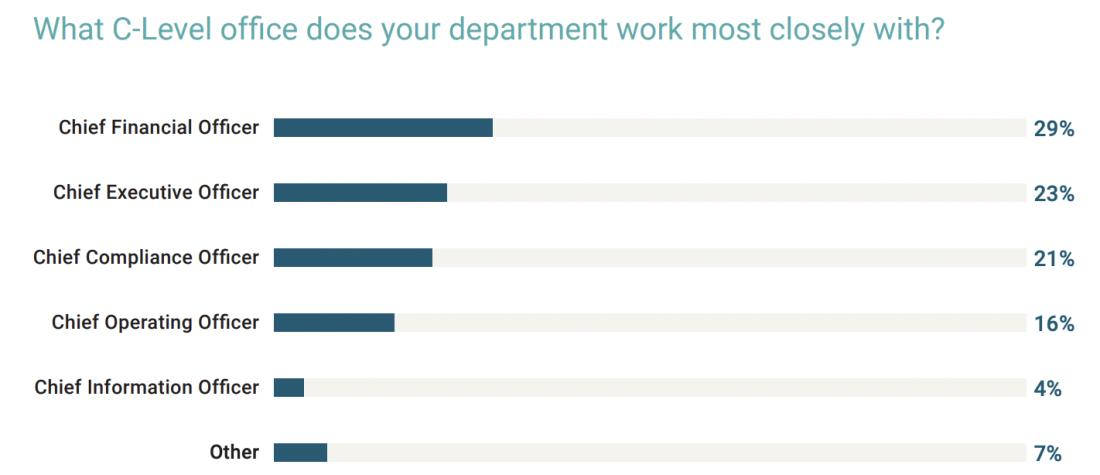Digital Transformation Arrives (Finally!) for In-House Counsel
by Shana Simmons

Digital transformation has been a tech industry stump speech for more than a decade, with its effects progressing slowly but steadily across the enterprise. In many ways, in-house legal departments have been slow to digitally transform, sticking instead with practices and processes rooted in tradition.
But now, findings contained in “The State of Corporate Litigation Today,” a survey and report recently issued by the Association of Corporate Counsel (ACC) and Everlaw, convince me that digital transformation will soon accelerate at light speed within in-house legal departments. Let’s take a look.
Shifting Workloads Drive Digital Transformation
In today’s uncertain economy, companies are under pressure to cut costs. Large-scale layoffs at Twitter, Facebook and other tech companies have dominated recent headlines, but legal departments are taking a different approach. Instead of reducing staff, the ACC survey found that “moving more work in-house is the most cited litigation cost containment strategy,” with 59% of respondents taking this tack. The least common strategies involve leveraging technology or artificial intelligence, cited by just 12%.
On the other hand, almost half of the participants said the top skill needed for the next generation of in-house legal professionals is the ability to adopt new technology! Fully 56% of respondents to the ACC survey said they expect their department’s technology needs will increase in a year from now, and 85% said that in-house legal professionals need to understand new technology and its impact on legal work and operations.
Furthermore, when asked what the most critical non-legal skill will be for the next generation of in-house professionals, 47% of respondents said it will be the ability to adopt new technology, more than three times higher than the second and third skills listed: the ability to navigate complex ethical issues (15%), and empathy and understanding (15%).
Technology Is the Ultimate Productivity Lever
Clearly, there’s a big disconnect between rising workloads and the expectation that technology will play an important role “sometime” in the future. With technology specifically designed to give in-house teams control over their litigation and investigations process, such as Everlaw Corporate Essentials, chief legal officers can now give in-house teams fit-for-purpose software to unlock productivity.
With the right tools, strapped legal teams, facing mounting workloads and increasing pressure, can take control of work that is often done manually or outsourced, delivering tangible value in key areas, by:
Controlling sensitive information by ingesting corporate data into one, secure litigation platform, from core workplace tools Microsoft Office 365, Slack, Box and Google Workspace.
Uncovering key case insights at the outset, to improve litigation posture and reduce costs. By reviewing data in-house, with easy-to-use analytics and AI, corporate legal teams can uncover meaningful insights quickly, allowing them to respond early and with confidence when new matters emerge.
Automating legal holds to reduce risk, with custom custodian directories, built-in tracking and auto-escalations, replacing manually sent emails and tracking spreadsheets prone to human error.
Collaborating seamlessly across functions and teams to manage end-to-end internal investigation and litigation processes, collaborating with HR, Legal and external partners.
These core capabilities can go a very long way in improving the productivity of in-house legal teams, freeing up invaluable time for more business-critical tasks.
Partner with Your CIO
Your company’s CIO is ready to be enlisted as an ally in getting the legal department what it needs. They really want to help. This analysis from CIO Magazine helps explain why:
[T]he CIO role continues to evolve. It has moved from focusing only on uptime and availability — the so-called ‘lights-on’ function — and has even advanced past prioritizing cost-cutting and efficiency gains. Now the position is entrenched in the executive suite, where it is facing the requirement to partner with the business and strategize on how technology can transform its value prop to customers.
That’s evident in the 2022 Tech Trends survey from Info-Tech Research Group. The firm polled CIOs about their priorities and found that business process improvements, digital transformation or modernization, and security were the top three.
Let’s compare this “vibe check” with what the ACC survey found:
62% of participants report that the legal department works at least “moderately closely” with the CIO to support the legal technology needs of the business.
12% state that this working relationship is “extremely close”
Another 16% say it’s “very close”
But when asked the question, “What C-level office does your [legal] department work most closely with?” the CIO came in at a distant fifth, named by just 4% of respondents. (Full disclosure: Consistent with this data point, another one in five participants (20%) in the ACC survey admit that the relationship between legal and the CIO is “not at all close.”)

There is a saying in sales organizations, “Ask for the order.”
Which is exactly the position legal departments are in today, in terms of acquiring the technology they need to succeed when more work is flowing in-house, in a hiring environment that is conservative at best.
What can in-house legal organizations hope to achieve by upping their technology game? Here’s an interesting strategic viewpoint on the evolution of digital transformation:
The final stage of the evolution, or what is currently the best way to enable transformation, involves threading systems of productivity and outcomes together. By linking digitization to productivity and outcomes, you can make sure these other systems you use are working together to create efficiencies for your team, your customers and your company — without adding to their existing workload.
Which is exactly what today’s in-house teams need. If it’s true that legal departments are among the last to digitally transform, I’d say the timing to do it now is absolutely perfect. Well done, counselors!
Learn more about how Corporate Essentials helps you take control of the discovery process with a modern solution designed for in-house teams.
To keep up with the latest in how digital transformation is accelerating across the legal industry, follow Everlaw and me on LinkedIn.

Shana Simmons is the Chief Legal Officer at Everlaw. As the company’s legal strategist, Shana advises Everlaw’s executive leaders and Board of Directors, to drive business growth while mitigating risk. She leads the legal department and is responsible for all legal, regulatory, privacy and governance, risk and compliance issues across the company. A recognized thought leader, Shana appears frequently in industry and national news publications and podcasts, and is a sought-after, inspirational guest speaker at a wide range of conferences and events. See more articles from this author.